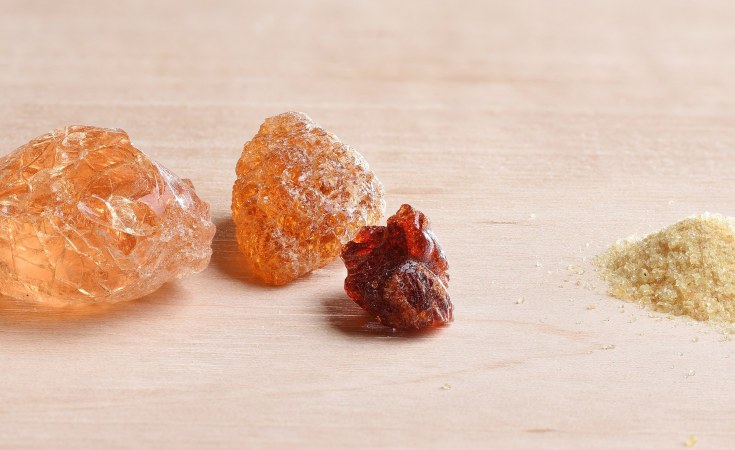The natural occurring gum discharged by Acacia trees is used in several key industries. The ongoing conflict in Sudan is hurting exports and threatening livelihoods.
Gum arabic, also known as E414, has several uses in diverse industries ranging from pharmaceuticals to shoe polish, and sweets and cosmetics. The ancient Egyptians used the the natural emulsifier for mummification purposes.
For the process of making fizzy drinks, the stabilizer plays a key role in preventing the sugar present in the drink from falling to the bottom and crystallizing.
Sudan is the leading producer of gum arabic globally and accounts for approximately 70% of global total exports; many Sudanese people depend on the gum directly and indirectly as their source of income. The ongoing fighting there means those exports have essentially ground to a halt.
According to data from The Observatory of Economic Complexity, a data visualization site for trade data, Sudan exported $111 million (€99 million) worth of gum arabic in 2021, making it the second-largest exporter globally. The main recipients of the gum exports include France, the United States and Germany.
Hussein Ali, a journalist based in Sudan, told DW that "the continuation of the war means stopping gum arabic exports which will cause a crisis for major companies. It is expected that if the war drags on for long, companies' strategic reserves will run out."
Many locals depend on selling the gum to make ends meet, but since clashes broke out in April between General Abdel Fattah Burhan's Sudanese Armed Forces and General Mohammed Hamdan Dagalo's Rapid Support Forces that has become increasingly difficult.
As a result, the ongoing conflict is starting to affect trade and businesses in the country.
"The product is an important crop of Sudan which ranks second or third in importance according to the list of exports," Professor Abulgasim Seifeldin, former head of the Agricultural Research Cooperation in Sudan, told DW.
What is gum arabic?
Gum arabic is a fluid of naturally growing plants called acacias which grow in arid and semi-arid areas, notably in the Sahel region, in the so-called gum belt stretching across several countries.
When the acacia trees get damaged either by fires, insects or other causes, the trees react by producing the gum to close off the exposed pores to avoid water evaporating from the tree due to the heat in these areas. The gum essentially helps the tree maintain it's water content for survival.
There are two types of gum arabic, namely acacia Senegal and acacia Seyal. The first is considered superior due to its ability to easily dissolve in water, and mainly grows in Sudan.
How is gum arabic produced?
Farmers typically make an incision to the acacia tree in a process called tapping. The gum oozes through the area and dries off when it comes into contact with air and sunlight. After a few weeks, the farmers collect the dried gum in a process that is repeated during the harvesting season.
Abulgasim Seifeldin notes that many farmers still use hand tools to get a small yield which he estimates to be around 250 grams (8.9 ounces) per tree.
After collection the gum is sorted and cleaned then sold to merchants who in turn sell it to processing and export companies who then process it through heat treatment to form spray-dried acacia gum.
What are the uses of gum arabic?
The two types of gum are used in diverse industries ranging from textile, adhesives, paint, cosmetics, pharmaceuticals and the food industry.
The food industry heavily relies on the gum as an organic food additive and as a source of prebiotic fiber. The gum does not alter the original properties of foods and can be found in confectionery, sauces and dressings, bakery products, dairy products, and beverage products.
For fizzy drinks giants like Coca-Cola and Pepsi, who have said that they cannot produce their global favorite brands without the key ingredient, the importance of steady and reliable supply of the gum is unprecedented. Coca-Cola did not respond to DW's requests for comments.
How important is the gum?
Such is the gum's importance that it was the only commodity to be excluded from the US sanctions list imposed on Sudan in the 1990s and 2000s.
The Hamburg-based Association for the International Promotion of Gums (AIPG) told DW in a written statement that, "AIPG members are closely monitoring developments with their local partners, and hope that a peaceful solution can soon be found, so that the acacia gum market, which is an essential source of income for the rural population, can return to normal in this country."
The situation is becoming increasingly untenable for many farmers, says Abulgasim Seifeldin. "Production will be affected because the farmers will be unable to go to the field, unable to export, unable to sell, unable even to clean. The merchants may not be able to have their gum cleaned and packed and then taken to Port Sudan."
Edited by: Rob Mudge


